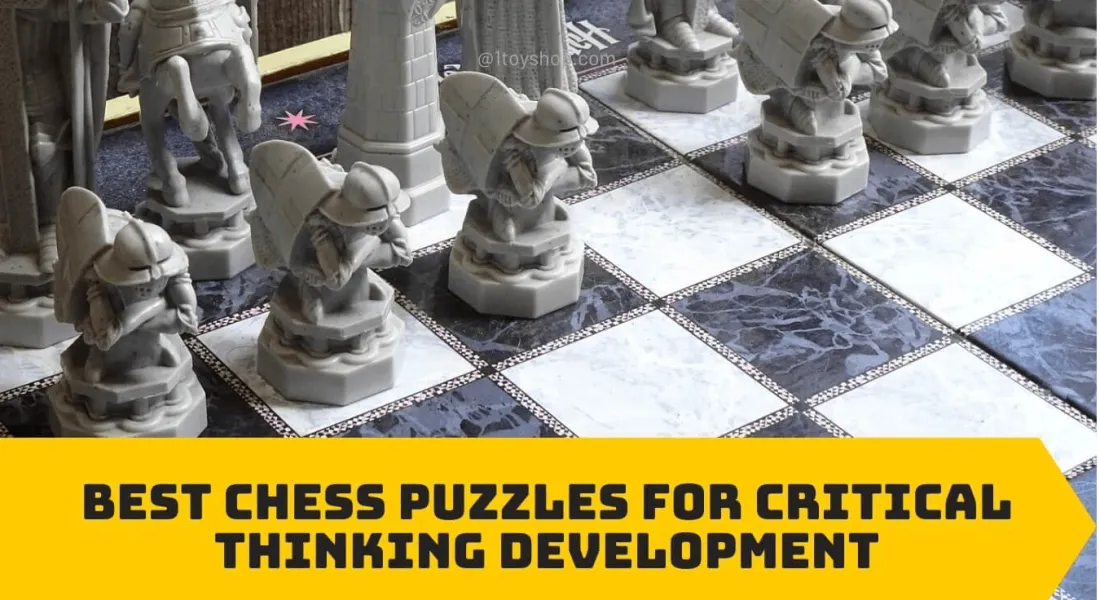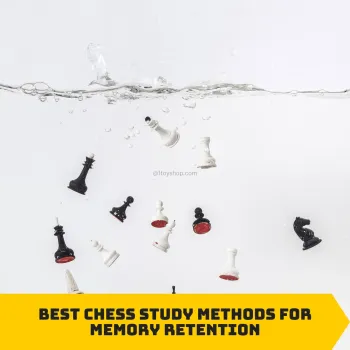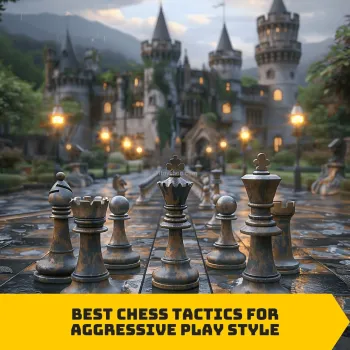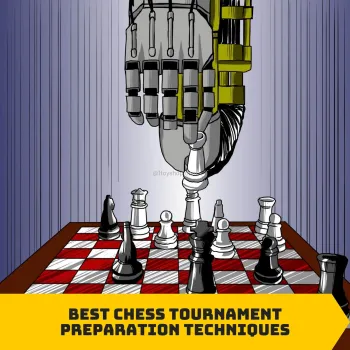Best Chess Puzzles For Critical Thinking Development
On
20/09/2024Reading time:
3 min
Summary:
The Power of Chess for Mental Growth
Chess, the age-old game of kings and queens, has long been celebrated for its ability to sharpen the mind. But did you know that solving chess puzzles can be just as beneficial as playing a full game?

To Get More Wonderful Toys And Take Discount Today. Click On The Image.
These brain-teasers are not only fun but also serve as excellent tools for developing critical thinking skills. Let's explore some of the best chess puzzles that can help you enhance your problem-solving abilities and strategic thinking.
What Are Chess Puzzles?
Before we dive into specific puzzles, let's understand what chess puzzles are. Chess puzzles are pre-set board positions where you're challenged to find the best move or series of moves. They're like snapshots from real games, designed to test and improve various aspects of your chess skills.
Types of Chess Puzzles
Mate in One: Find a move that checkmates the opponent immediately.
Mate in Two (or more): Find a sequence of moves leading to checkmate.
Tactical Puzzles: Spot combinations that lead to material gain or positional advantage.
Endgame Studies: Solve complex endgame positions.
Compositional Puzzles: Artificial positions created to demonstrate beautiful or surprising chess ideas.
The Best Chess Puzzles for Critical Thinking
1. The Classic "Mate in Two"
Mate in Two puzzles are excellent for developing foresight and planning. They require you to think two moves ahead, considering both your moves and your opponent's possible responses. Here's a simple example:
White to move and mate in two:
King on e1, Queen on h5, Pawn on g2
Black King on h8, Pawns on g7 and h7
Can you figure out the solution? (Hint: It involves a quiet first move followed by a decisive second move.)
2. The Knight's Tour
While not a traditional chess puzzle, the Knight's Tour is a classic problem that enhances spatial awareness and planning skills. The challenge is to move a knight to every square on the chessboard exactly once. This puzzle comes in two variations:
Open Tour: The knight can end on any square.
Closed Tour: The knight must end on a square that's one knight's move away from the starting square.
Trying to solve this puzzle will improve your ability to visualize complex patterns and think several steps ahead.
3. Tactical Puzzles: Forks and Pins
Tactical puzzles that involve forks (attacking two pieces simultaneously) or pins (immobilizing a piece) are fantastic for developing pattern recognition and combinatorial thinking. These puzzles often arise from real game positions, making them particularly useful for practical play.
Here's a simple fork puzzle to try:
White to move and win material:
White Knight on e5, Black Queen on c6, Black King on e8
Can you spot the fork that wins material for White?
4. The Endgame Study
Endgame studies are often beautifully crafted positions that require deep, creative thinking to solve. They can involve counterintuitive moves and long, precise calculations. While challenging, these puzzles are incredibly rewarding and can dramatically improve your endgame play.
A famous example is the Saavedra Position:
White to move and win:
White King on a6, Pawn on c6
Black King on a8, Rook on d5
This study, which dates back to 1895, involves a surprising underpromotion and is considered one of the most famous chess compositions of all time.
Benefits of Solving Chess Puzzles
Regularly solving chess puzzles offers numerous benefits:
Improved Pattern Recognition: You'll start to recognize common tactical and strategic motifs more quickly.
Enhanced Calculation Skills: Puzzles force you to calculate variations accurately, a crucial skill in chess.
Increased Creativity: Many puzzles require thinking outside the box, fostering creative problem-solving.
Better Time Management: Timed puzzle-solving can help you make decisions more efficiently under pressure.
Strengthened Memory: Remembering puzzle solutions helps reinforce chess patterns in your long-term memory.
How to Incorporate Chess Puzzles into Your Routine
To get the most out of chess puzzles, try these tips:
Start Simple: Begin with easier puzzles and gradually increase difficulty.
Set a Daily Goal: Aim to solve a certain number of puzzles each day.
Analyze Your Mistakes: When you get a puzzle wrong, take time to understand why.
Mix It Up: Vary the types of puzzles you solve to develop different skills.
Use Online Resources: Websites like Chess.com and Lichess offer daily puzzles and vast puzzle databases.
Conclusion: Chess Puzzles as a Path to Mental Mastery
Chess puzzles are more than just fun diversions; they're powerful tools for developing critical thinking skills. Whether you're a seasoned chess player or a complete beginner, incorporating chess puzzles into your daily routine can lead to significant improvements in your problem-solving abilities, strategic thinking, and overall cognitive function.
So why not give it a try? Start with a simple mate-in-one puzzle today, and who knows? You might find yourself hooked on the captivating world of chess puzzles, embarking on a journey of continuous mental growth and discovery. Remember, every puzzle solved is a step towards a sharper, more agile mind. Happy puzzling!
Source: Team 1ToyShop (1.T.S) compiled, analyzed and wrote.

Best Chess Study Methods For Memory Retention
Author name
23.07.2024
Mastering Chess: Effective Study Methods for Long-Term Memory Retention

Best Chess Tactics For Aggressive Play Style
Author name
24.07.2024
Mastering Aggressive Chess Tactics: A Guide to Dominating the Board

Best Chess Tournament Preparation Techniques
Author name
23.07.2024
Winning Strategies: Preparing for Chess Tournaments Like a Pro
